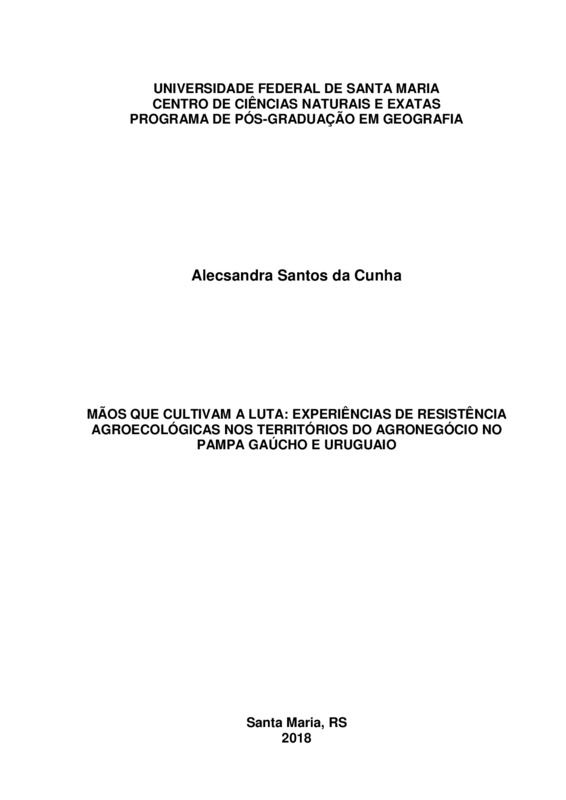-
Título
-
MÃOS QUE CULTIVAM A LUTA: EXPERIÊNCIAS DE RESISTÊNCIA AGROECOLÓGICAS NOS TERRITÓRIOS DO AGRONEGÓCIO NO PAMPA GAÚCHO E URUGUAIO
-
lista de autores
-
ALECSANDRA SANTOS DA CUNHA
-
Resumo
-
O modelo hegemônico de produção agrícola, representado pelo agronegócio e blindado pelo Estado Neoliberal, influencia a economia mundial e, sobretudo, atua diretamente nos territórios rurais. Contudo, contribui para o processo de acumulação do capital, pressionando a agricultura familiar camponesa e, baseado em pacotes tecnológicos, se torna econômica e ambientalmente insustentável. Nesse sentido, a Agroecologia ocupa um lugar de enfrentamento ao agronegócio, pois as experiências de resistências agroecológicas buscam outra forma de produzir e viver no campo. Essas relações de enfrentamento forjam os territórios rurais, tendo as experiências de resistências agroecológicas como protagonistas na luta pelo direito de se reproduzirem socialmente em seus territórios. Dessa forma, buscamos compreender as experiências de resistência no sentido de estarem transformando suas realidades a partir da incorporação de um novo paradigma que se fundamenta nos preceitos da Agroecologia como alternativa ao grande capital, representado pelo agronegócio. Assim, pergunta-se: quais as práticas utilizadas pelas duas famílias envolvidas nessa investigação, que as levam à resistência? As duas áreas de estudo, uma família brasileira estabelecida na Campanha Gaúcha e uma família uruguaia localizada em Canelones, apresentam o universo camponês envolvido por subjetividades e, sobretudo, sua base material que possibilita a reprodução social. A formação sócio-histórica brasileira e uruguaia e o avanço do neoliberalismo sobre seus territórios contextualizam a pesquisa, que foi desenvolvida trazendo as aproximações e distanciamentos, de cada família, comparadas ao Tipo Ideal de Weber. Utilizando técnicas de observação direta, conversas informações, fotografias, mapas mentais, calendários sazonais, entre outros, a pesquisa clareia esse universo envolto de subjetividades e materialidades. O cenário vislumbrado é de luta e resistência contínua, que hora avança e hora retrocede. A resistência camponesa agroecológica forja suas lutas com estratégias diversas. Pode ser percebido que a resistência camponesa agroecológica está centrada nas estratégias de reprodução, contudo, necessita de políticas públicas que intervenham no avanço do agronegócio sobre os territórios camponeses, devido, sobretudo, ao seu poder político e econômico.
-
Abstract
-
The hegemonic model of agricultural production represented by agribusiness and secured by the Neoliberal State, influences the global economy and, above all, operates directly in rural territories. The model contributes to the accumulation of capital, pressuring the peasant family and, alongside technological advances, becomes economically and environmentally unsustainable. Due to this, Agroecology is in direct confrontation with Agribusiness, as the experiences of agroecological resistances seek other ways of producing and living in the countryside. These conflict ridden relations forge rural territories, for the experiences of agroecological resistances become the protagonists in the struggle for the right to reproduce socially in their territories. Hence, we seek to understand experiences of resistance as a transformation of reality through the introduction of a new paradigm founded on the precepts of Agroecology as an alternative to great capital, which is represented by agribusiness. Thus the question stands: what are the practices used by the two families involved in this research, that lead them to resistance? The two areas of study, a Brazilian family established in the Gaucho Planes and a Uruguayan family located in Canelones, reflect the peasant universe characterized by subjectivity and, above all, a material base the enables social reproduction. The Brazilian and Uruguayan socio-historical development and the expansion of neoliberalism over these territories, contextualize this research, which was developed considering the similarities and differences of each family in comparison to the Ideal Type of Weber. Using techniques of direct observation, information talks, photographs, mind maps, seasonal calendars, amongst others, this research sheds light on the peasant universe that is currently characterized by subjectivities and material goods. The scenario shown is one of struggle and continuous resistance which, at times, advances and, at times, recedes. The agroecological peasant resistance forges its struggle with diverse strategies. It can be concluded that the agroecological peasant resistance is centered on reproduction strategies, however, in order for it to thrive, it needs public policies that intervene in the expansion of agribusiness over peasant territories, due to, above all, agribusiness’ political and economic power.
-
Palavras Chave
-
AGROECOLOGIA
-
AGRICULTURA FAMILIAR CAMPONESA
-
RESISTĘNCIA
-
PAMPA GAÚCHO
-
PAMPA URUGUAIO
-
Key Words
-
AGROECOLOGY
-
PEASANT FAMILY FARMING
-
RESISTANCE
-
PAMPA GAUCHO
-
PAMPA URUGUAIO
-
Tipo
-
DOUTORADO
-
Universidade
-
UNIVERSIDADE FEDERAL DE SANTA MARIA
-
Local
-
SANTA MARIA
-
Data
-
2018
-
Páginas
-
331
-
Localização
-
Biblioteca Digital de Teses e Dissertações (BDTD UFSM)
-
Orientador
-
ANA ESTELA DOMINGUEZ SANDOVAL
-
Programa
-
Programa de Pós-Graduação em Geografia e Geociências
-
Sigla Universidade
-
UFSM
-
Área de Concentração
-
ANÁLISE AMBIENTAL E TERRITORIAL DO CONE SUL
-
Língua
-
Português
-
email
-
ALECSANDRASCUNHA@GMAIL.COM

